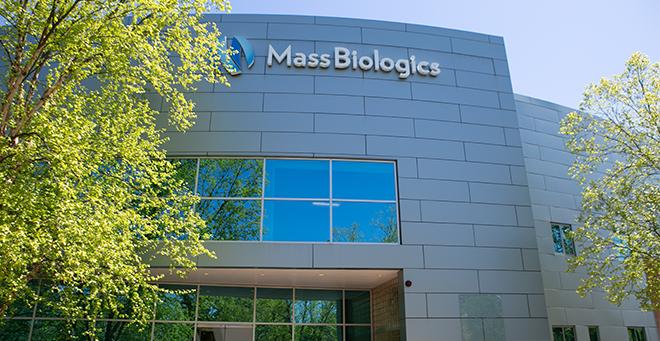
Credit: UMass Medical School
A new study by researchers at MassBiologics of UMass Medical School published in Nature Communications suggests that COVID specific IgA monoclonal antibodies may provide effective immunity in the respiratory system against the novel coronavirus – a potentially critical feature of an effective vaccine.
Yang Wang, MD, PhD, deputy director for product discovery at MassBiologics and associate professor of medicine, and colleagues describe the discovery and characterization of a cross-reactive human monoclonal antibody (MAB) to SARS-CoV-2 spike proteins which blocks ACE2 receptor binding on the mucosal tissue of the respiratory tract – potentially preventing or limiting SARS-CoV-2 infection causing COVID-19 disease.
Like scientists around the world, the research leadership at MassBiologics started talking about what became known as SARS-CoV-2 within days of the first cases of when the novel coronavirus were first reported. MassBiologics was in a unique position to respond, and those early discussions have resulted in the discovery of a novel approach to prevent and treat SARS-CoV-2 infection.
The origins of this rapid and important discovery go back 16 years, when MassBiologics developed an IgG monoclonal antibody that was effective against a similar virus, SARS (that was SARS-CoV, the first severe acute respiratory syndrome caused by a novel coronavirus). That first SARS virus caused alarming illness, but then disappeared; MassBiologics, which was ready at the time to initiate a clinical trial, saved the research materials associated with that work.
When SARS-CoV-2 was recognized and began to spread, MassBiologics researchers realized that that first MAB might help with this new infection. They launched the process of resurrecting the old SARS program, retrieving frozen hybridoma cells that had been developed 16 years earlier, thawing them and determining if what worked for one novel coronavirus would work for another. Although there was 90 percent similarity between the two coronaviruses, the monoclonal antibody exhibited no binding to the current coronavirus. MassBiologics then evaluated another MAB from that earlier work, which was also only weakly effective.
Undeterred, Wang and colleagues thought about their experience with a separate research program to develop “secretory IgAs (sIgA),” antibodies that play a crucial role in immunity on mucosal surfaces. MassBiologics has been investigating sIgA in the GI tract as a possible therapeutic to prevent gastrointestinal infections. Would similar anti-SARS-CoV-2 sIgA produce passive mucosal immunity in the respiratory tract, where COVID-19 disease is incredibly damaging? The approach worked, producing an antibody with binding affinity and neutralization activity. This antibody was designated MAb362.
“We were excited to learn that antibodies to SARS-CoV-2 are more effective in binding to and neutralizing the virus when they are in the sIgA isotype of antibody, compared to the usual circulating IgG antibodies,” said Mark Klempner, MD, executive vice chancellor for MassBiologics and professor of medicine. “In nature, sIgA antibodies coat mucosal surfaces like the respiratory, GI and GU tracts, where they are stabilized by the mucous layer on these surfaces. There, they perform the important function of preventing binding of a pathogen to host cells, thus preventing infection.”
Based on these results, MassBiologics worked with Celia Schiffer, PhD, the Gladys Smith Martin Chair in Oncology, professor of biochemistry & molecular pharmacology, and director of the Institute for Drug Resistance, and her then-graduate student, Shurong Hou, who has since completed her studies and earned her PhD, to see if they could understand the nature of the effect of the IgA antibody. Drs. Schiffer and Hou found MAb362 shared a highly similar framework with MAb 80R, another SARS-CoV antibody with a crystal structure in complex with SARS-CoV. A molecular model revealed a highly conserved protective epitope within the receptor-binding domain of the S protein. MAb362 neutralizes authentic SARS-CoV-2 virus by directly out-competing the S protein’s binding to hACE2 receptors.
“So our search -which started during a coffee break conversation,” said Klempner, “has resulted in a unique IgA antibody that could potentially be applied through mucosal administration, in combination with other systemically administrated therapeutics for direct mucosal protection.”
###
Media Contact
Sarah Willey
[email protected]
Original Source
https:/




